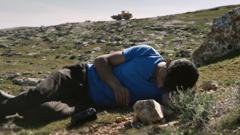The Oscar-nominated documentary "No Other Land" explores the friendship between a Palestinian filmmaker and an Israeli journalist against the backdrop of escalating tensions in the West Bank. The film, focusing on the struggle for survival in Masafer Yatta, seeks to incite change while calling for international attention to ongoing violence and violations.
Oscar-Nominated Documentary 'No Other Land' Highlights Hopes for Change in the West Bank

Oscar-Nominated Documentary 'No Other Land' Highlights Hopes for Change in the West Bank
A powerful film shines a light on the plight of Palestinians, presenting deep friendships amidst political turmoil and violence.
In the shadow of an Israeli army bulldozer, Basel Adra, a Palestinian filmmaker, captures the heart-wrenching realities of life in the West Bank, alongside his Israeli friend Yuval Abraham. Their documentary "No Other Land," nominated for an Oscar and a BAFTA, explores the destruction faced by the Masafer Yatta community, and the enduring hope for change amid despair.
As they film the demolition of homes and public facilities, the two friends confront their harsh realities. "I don't have an illusion that films are going to change the world, but they can change individuals," Yuval explained, emphasizing the need for heightened awareness among those in power.
Over the course of five years, the film chronicles a range of events, from Basel’s near-detainment during protests to a tragic incident where an Israeli soldier shot and paralyzed a community member amid claims of illegal construction enforcement. The documentary highlights a struggle for justice, underscoring the increased violence that has escalated since the recent conflict triggered by Hamas attacks on Israel.
The precarious living conditions in the area are accentuated by a controversial Israeli Supreme Court ruling that allowed forced evictions and demolitions, claiming the land as a closed military zone. This narrative is further complicated by ongoing settler violence, exacerbated by the current geopolitical climate, including U.S. policies seen to support such actions.
Despite their triumph in securing international acclaim, "No Other Land" struggles to find a distributor in the U.S., raising concerns about the broader impact of their message. As tensions rise in the West Bank, Basel and Yuval’s film documents not only the ongoing struggle but also casts a spotlight on personal stories of resilience and the quest for a peaceful coexistence, echoing Basel's sentiment that "one water drop doesn't make change, but keep dropping the water and it will make change."
As they continue their fight for recognition, both filmmakers remain hopeful their work can inspire global awareness and action toward achieving a fair political resolution for all parties involved in this decades-long conflict.
As they film the demolition of homes and public facilities, the two friends confront their harsh realities. "I don't have an illusion that films are going to change the world, but they can change individuals," Yuval explained, emphasizing the need for heightened awareness among those in power.
Over the course of five years, the film chronicles a range of events, from Basel’s near-detainment during protests to a tragic incident where an Israeli soldier shot and paralyzed a community member amid claims of illegal construction enforcement. The documentary highlights a struggle for justice, underscoring the increased violence that has escalated since the recent conflict triggered by Hamas attacks on Israel.
The precarious living conditions in the area are accentuated by a controversial Israeli Supreme Court ruling that allowed forced evictions and demolitions, claiming the land as a closed military zone. This narrative is further complicated by ongoing settler violence, exacerbated by the current geopolitical climate, including U.S. policies seen to support such actions.
Despite their triumph in securing international acclaim, "No Other Land" struggles to find a distributor in the U.S., raising concerns about the broader impact of their message. As tensions rise in the West Bank, Basel and Yuval’s film documents not only the ongoing struggle but also casts a spotlight on personal stories of resilience and the quest for a peaceful coexistence, echoing Basel's sentiment that "one water drop doesn't make change, but keep dropping the water and it will make change."
As they continue their fight for recognition, both filmmakers remain hopeful their work can inspire global awareness and action toward achieving a fair political resolution for all parties involved in this decades-long conflict.




















